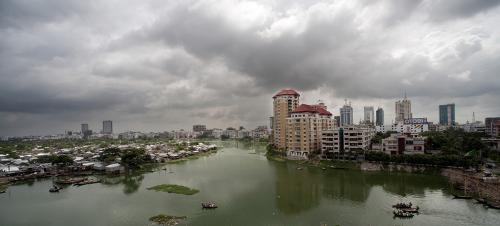‘Ground-breaking innovation’ needed in cities, where battle for sustainable development will be won or lost, says UN agency chief
If the battle to achieve the Sustainable Development Goals (SDGs) is to be won or lost in cities, then they need to “achieve a lasting impact on communities and to ensure that no one is left behind,” the head of the UN agency dealing with sustainable urban development said on Wednesday.

View of the city of Dhaka, Bangladesh.
Opening the high-level session of the first UN-Habitat Assembly in Nairobi, Maimunah Mohd Sharif, Executive Director of the United Nations Human Settlement Programme, UN-Habitat, explained that innovation – which she defined as “new knowledge and solutions to improve living conditions for all in cities and communities” – is the central theme of the Assembly because cities, which drive national economies by “creating prosperity, enhancing social development and providing employment,” can also be breeding grounds for poverty, exclusion and environmental degradation.
Therefore, she said, cities “will have to continue to drive innovation in ground-breaking ways,” for the benefit of all, as envisaged in the 2030 Agenda for Sustainable Development, the UN’s blueprint for ending poverty, protecting the planet and ensuring peace and prosperity for all.
Innovative and smart solutions are part of the reasons that cities and regions grow prosperous, added Ms. Mohd Sharif, asking delegates to consider how to promote smart urban technologies that can handle the major systems a city requires ─ such as water, transport and clean energy ─ to improve the quality of life for all citizens; how countries should create an environment that encourages innovative solutions to poverty; and how best to make use of new knowledge to better serve communities.
UN-Habitat, said Ms. Mohd Sharif, plans to become a centre of excellence and innovation that “sets the global discourse and agenda on sustainable urban development,” which generates “innovative, specialized and cutting-edge knowledge.”
As an example of UN-Habitat’s willingness to engage with the latest innovations in order to engage with the latest threats faced by today’s diverse urban areas, such as climate change and growing inequality, the programme convened the first ever Round Table on Sustainable Floating Cities, at UN Headquarters in New York in April.
Praising the work of UN-Habitat, Deputy Secretary-General Amina Mohammed said that cities can no longer be built the way New York or Nairobi were build: new cities must be “built for people, not cars. And we must build cities knowing that they will be on the frontlines of climate-related risks — from rising sea levels to storms. Floating cities can be part of our new arsenal of tools.”
Source:UN
- 277 reads
Human Rights
Ringing FOWPAL’s Peace Bell for the World:Nobel Peace Prize Laureates’ Visions and Actions

Protecting the World’s Cultural Diversity for a Sustainable Future

The Peace Bell Resonates at the 27th Eurasian Economic Summit

Declaration of World Day of the Power of Hope Endorsed by People in 158 Nations

Puppet Show I International Friendship Day 2020

